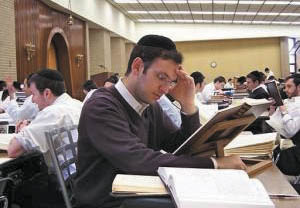
Every Friday night, I help run a “Carlebach” service in Beit Shemesh. It’s a unique service that brings together Jews from all backgrounds to pray, sing and dance on a weekly basis. While closing up the synagogue this past Friday night, a Hasidic man in his early 30s who was at this service for the first time approached me and introduced himself.
“Before you were elected to the Knesset, I was in kollel (religious seminary for married men), and could not support my growing family,” he began. “So I went to work. But I felt like a second-class citizen when I did so, and was made to feel that way by those around me who were still in kollel. It got so bad that when I saw someone who knew me walking by the place where I worked, I would hide so they would not see me working.”
I began telling him how bad I felt for him, but he cut me off.
“Don’t worry, it all changed when you came into office. The moment you changed the government’s policies and cut the stipends, and it was no longer financially worthwhile to stay in learning instead of working, massive numbers of kollel guys began working. This made it acceptable in our community to work, and I no longer felt like a second-class citizen and I did not have to hide any longer.”
He said that despite the protests against the stipend cuts from many in the ultra-Orthodox community, he and many others supported our effort. He also agreed that working to support your family with dignity is not only consistent with being a Talmudic scholar and fervently religious, but is actually the ideal.
My new Hasidic friend then said that while he was thankful he had a job, it was not the type of job he wanted. He blamed this on his inability to speak English, and was frustrated that many religious schools in Israel don’t teach English. “Why didn’t they teach us English? What could possibly be wrong with English?”
I told him that he was correct, and that was why my political party, Yesh Atid, cut into the funding of schools that did not teach English, and pushed to introduce English instruction in all schools.
I said that I needed to start walking home, and he asked if he could join me to ask one last question.
“Those young men with the knitted kippot and untucked white shirts who were in that service just now—are any of them IDF soldiers?”
I told him that many are active soldiers, and that two or three of them were home from their first week of basic training.
“Unbelievable,” he replied. “They have it all. The way they danced and prayed, they are clearly very spiritual and religious. They are serving the country. And they, no doubt, have a general education. They have all that, while half of my cousins who were presented with a life of Torah-only are no longer religious. Had they known that an option of balance was available, they would still be religious.”
I told him that many in Israel are aware of the problem, and reassured him that we are committed to correcting it—and that this was among the reasons I entered politics in the first place.
This remarkable conversation reminded me to tune out the propaganda and rhetoric coming from the ultra-Orthodox media and its political leadership, and to keep on working at the important task at hand.
The American ultra-Orthodox and yeshiva community must wake up and recognize that this Hasid was not an aberration. He is a part of the silent majority whose voices have been stifled but are crying for help. We must not fight them, but help them. This is what will ensure the continuity of Judaism for generations to come.
By Dov Lipman /Algemeiner
Rabbi Dov Lipman served in the Israeli Knesset (2013-2015) with the Yesh Atid party, the first American-born MK in 30 years. He holds rabbinic ordination from Ner Israel Rabbinical College and a masters degree in education from Johns Hopkins University, and currently serves as director of public diplomacy in the vice chairman’s office of the World Zionist Organization.










